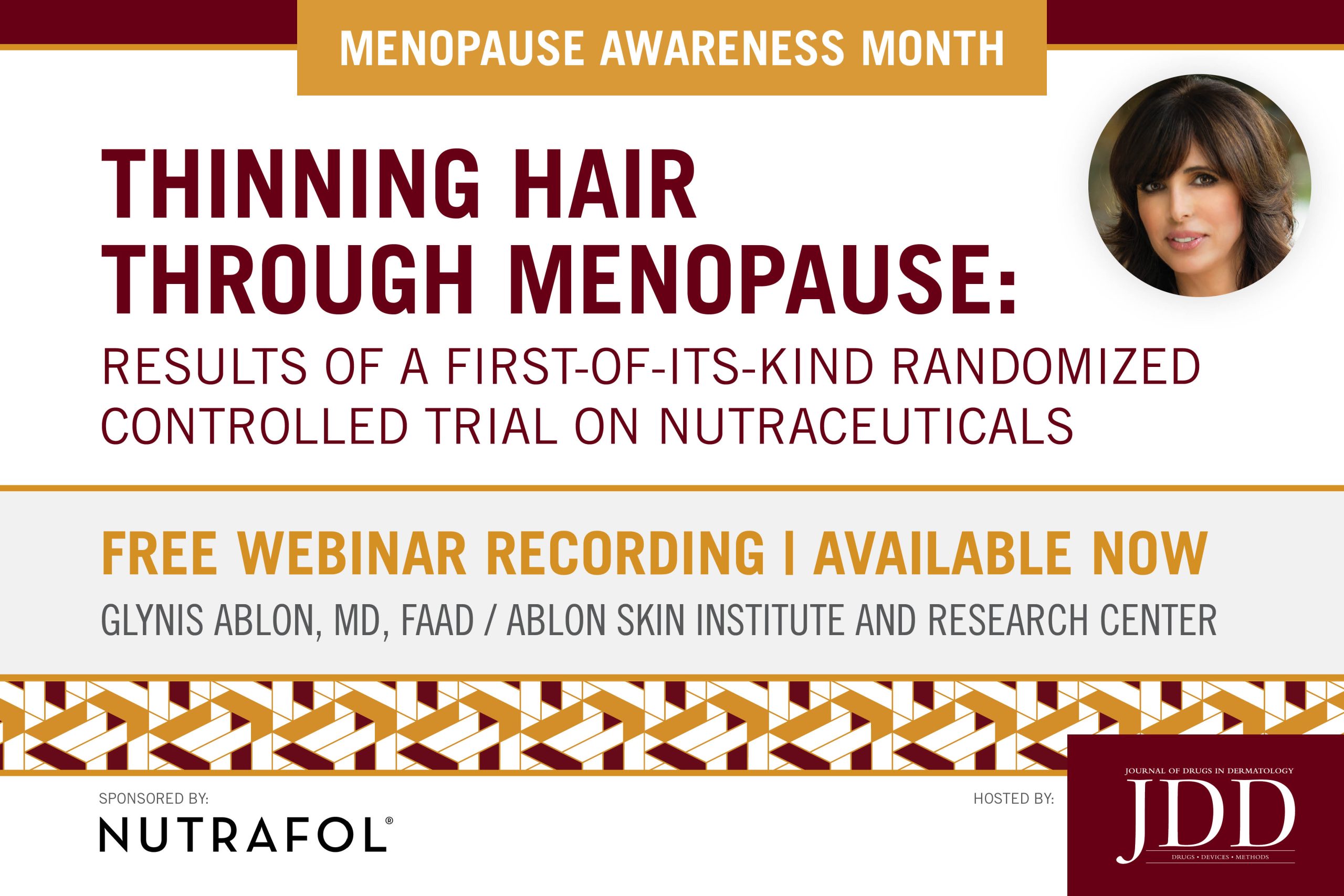
Supported By

Thinning Hair Through Menopause: Results of a First-of-its-Kind Randomized Controlled Trial on Nutraceuticals
Join the Journal of Drugs in Dermatology and Nutrafol in recognizing Menopause Awareness Month this October. This month aims to raise awareness of the possible health issues when approaching, during, and after menopause. Explore the content from Nutrafol below to improve your patient’s hair health during the menopausal transition and beyond.
Originally aired on February 9th, 2021, this webinar features Dr. Glynis Ablon who discusses age and menopause related hair changes, such as thinning. She also presents results from two publications on the clinical benefits of standardized nutraceuticals on hair in women going through the menopausal transition and beyond.
Faculty

Glynis Ablon, MD, FAAD
Ablon Skin Institute and Research Center
Watch On Demand
Read The Studies
Glynis Ablon MD FAAD, Sophia Kogan MD
January 2021 | Volume 20 | Issue 1
ABSTRACT: Hair loss is a complex and multi-factorial problem that is associated with significant psychological morbidity in women. Menopausal women represent a significant percentage of those affected, since the menopausal hormonal transition can be a contributing factor. A novel nutraceutical supplement has been specifically formulated with phytoactives to improve hair growth and quality in menopausal women (Nutrafol® Women’s Balance Capsules).
The objective of this 6-month, randomized, double-blind, placebo-controlled study was to assess the safety and efficacy of this oral supplement to promote hair growth in perimenopausal, menopausal, and postmenopausal women with self-perceived thinning. Subjects were randomized to the study supplement (n=40) or placebo (n=30). The primary endpoint was a statistically significant increase in the number of terminal and vellus hairs based on phototrichogram analysis. Daily intake of the nutraceutical supplement resulted in progressive and significant increase in terminal and total hair counts on days 90 (P<0.01) and 180 (P<0.01) compared to placebo. The vellus hair counts significantly increased for the active treatment group (P<0.05) by day 180 while significantly decreasing for the placebo group subjects. Hair shedding progressively and significantly decreased for the active group compared to placebo, culminating in a reduction of 32.41% by day 180 (P<0.01). The study supplement was well-tolerated.
Glynis Ablon MD FAAD, Sophia Kogan MD, Isabelle Raymond PhD
July 2022 | Volume 21 | Issue 7
ABSTRACT: The prevalence of female hair loss and hair thinning increases with advancing age and is most common among post-menopausal women. Recent statistics show that by age 60, an estimated 80% of women experience hair loss. A previous publication detailing the results of the 6-month randomized, double-blind, placebo-controlled phase of this study demonstrated the ability of a nutraceutical supplement to significantly improve hair growth and shedding compared to placebo. Here, we present results from a subsequent 6-month, open-label extension phase assessing the continued safety and efficacy of this nutraceutical for promoting and improving hair growth and evaluate potential long-term benefits on quality of life and menopausal symptoms. After a total of 12 months with the active nutraceutical, subjects had progressive improvements in hair growth, quality, and shedding. Quality of life measures and menopausal symptoms also improved over the duration of the study. When transitioned to daily intake of the supplement, subjects previously treated with placebo achieved significant increases in all hair counts, a significant decrease in shedding, and significant improvement in blinded investigator global hair growth and quality assessments. The results of this long-term study demonstrate that continued use of a novel nutraceutical provides significant incremental improvement over the beneficial effects achieved during the initial 6-month randomized, placebo-controlled phase. Continued use may provide ongoing improvements in hair growth and exert a positive effect on secondary symptoms of menopause, and quality of life in perimenopausal, menopausal, and postmenopausal women with self-perceived thinning hair.
You May Also Like


Get More from the JDD Webinars
Get the latest Webinar news delivered straight to your Inbox – sign up for the JDD Newsletter.
Discover the latest research, exclusive articles from leading dermatology experts,popular Podcast episodes, free CME activities, and more!








